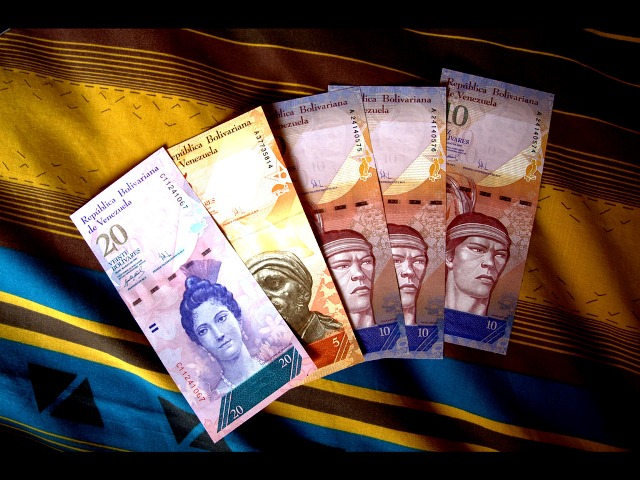Dollars enter Venezuelan banks as country battles economic woes - sources

- Country:
- Venezuela Rb
HIGHLIGHTS
- Several Venezuelan banks have begun storing in vaults millions of dollars and euros amid an unexpected economic liberalization.
- Dollars and euros mainly come from remittances by the millions of Venezuelans who have left in recent years, and from the OPEC member's oil and gold sales to allied nations.
- The custodial service, however, is not cheap. Clients pay monthly commissions of 1 to 2 percent of the deposits.
At least half a dozen Venezuelan banks have begun storing in vaults millions of dollars and euros accumulated in cash by businesses during an unexpected economic liberalization by President Nicolas Maduro, according to sources.
Some $1.8 billion worth has entered Venezuela in the last year, according to three senior banking sources, as Maduro quietly dismantles 16 years of socialist regulations to salve the economy in the face of U.S. sanctions and hyperinflation. The cash comes mainly from remittances - often on trucks - by the millions of Venezuelans who have left in recent years, and from the OPEC member's oil and gold sales to allied nations like Turkey and Russia, sometimes by plane, the sources said.
The private banks' new custodial service began discreetly in late 2019 and has not been previously reported in full. It is further evidence of how the ruling Socialist Party is allowing financial arrangements unthinkable for Venezuelans while dollar transactions were outlawed until 2018. The service is only offered to well-known firms with significant revenue and long-standing accounts, according to four finance industry senior executives. "It is a service for traditional customers," one said.
That is meant to avoid contact with companies linked to the government, which is under a broad sanctions program by the administration of U.S. President Donald Trump who views Maduro's government as an illegal dictatorship. The sources asked for the banks not to be named for security reasons given the delicate context and crime problems.
The custodial service is not cheap. Clients pay monthly commissions of 1 to 2 percent of the deposits - though for that they have instant access to the cash and regular security checks if they want.
In fact, the bank custodial services only manage around 10% of all hard currency in Venezuela, two of the bank executives said, meaning the rest is in improvised storage. The government, which does not discuss how dollars and euros enter the economy, did not respond to a request for comment. Though it has stopped enforcing longstanding currency and price control regulations, many of the rules remain on the books, so the situation could change quickly should Maduro shift tack.
DETERIORATING NOTES
With dollars increasingly used in routine transactions rather than the devalued local bolivar - which only has $44 million equivalent in circulation - Venezuelan pharmacies, grocery stores, and other businesses are often flush.
Euros also enter the system from government payments to contractors and weekly central bank sales. Large supermarket chains like the custodial services because they carry out a third of their operations in foreign currency, according to two retail executives.
Transfers to same-bank clients cost 1% of the operation. "The commission for storage of currency in bills is high because that money cannot be lent," said economist Leonardo Buniak. That helped send commissions' revenue up 300 times in 2019 from the year before, according to data from bank regulator Sudeban, making them a major source of income amid decline in most other types of financing activity.
Banks do not transfer cash holdings to accounts in other countries, the sources said because U.S. sanctions have made foreign banks nervous. That means the dollar and euro notes cannot be replaced as happens in most developing countries. "The notes do not leave the country and will deteriorate," said one of the executives.
Beyond the banks, foreign currency is stored and hidden in homespun ways. Some small-time merchants keep dollars in wooden crates, moving them on fast to pay off providers and reduce the possibility of theft. "You have to leave hard currency under a mattress because of the cost of bank services," said Vito Vinceslao, a representative of commerce association Consecomercio in the border state Apure where foreign currency flows spike due to the bustling cross-border trade. "Many businesses have safe deposit boxes in homes or stores to protect them."
(With inputs from agencies.)
- READ MORE ON:
- Nicolas Maduro
- Venezuelan
- Donald Trump
- Socialist Party
- OPEC
- Russia
ALSO READ
Venezuelan Opposition Leader's Strategic Latin America Tour
Venezuelan Leader Edmundo Gonzalez's Diplomatic Tour
Venezuelan Opposition Leader Meets Biden Amidst Electoral Controversy
Giorgia Meloni's Strategic Meeting with Donald Trump
Sebastian Stan's Challenging Role as Donald Trump and Golden Globe Triumph










